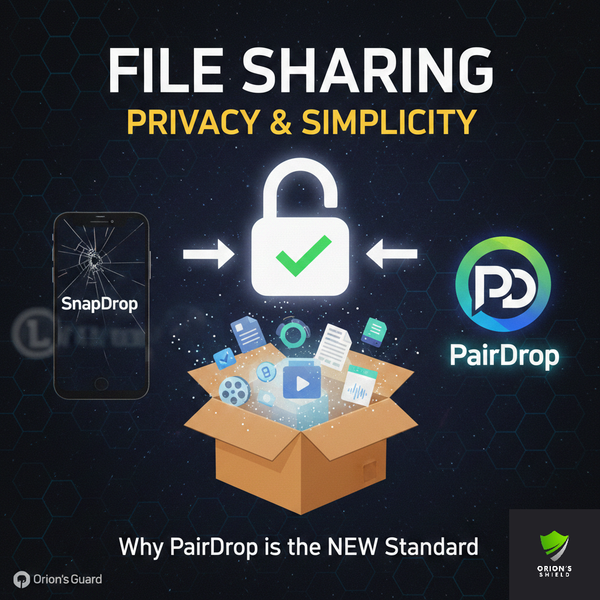iOS vs. Android: Neither is Ideal, But iOS Edges Out—And That’s a Damning Indictment of Mobile Privacy

Let’s cut the chase: In 2025, neither iOS nor stock Android is a paragon of privacy or security. They’re both products of profit-driven giants—Apple chasing ecosystem lock-in, Google monetizing your every tap. We stash more intimate data on our phones than anywhere else: health metrics, financials, intimate images, therapy notes, location trails that map our lives. Yet mobile OSes operate in a regulatory Wild West, with the least oversight of any digital frontier. Postal mail? Federally shielded under laws like the Fourth Amendment and ECPA for stored communications. Email? Bolstered by the Electronic Communications Privacy Act, requiring warrants for access beyond 180 days. 5 9 Your phone? Crickets—no equivalent federal guardrails, just a patchwork of state laws and voluntary corporate promises. It’s a scandal: Billions carry supercomputers of personal dossiers with less protection than a chain letter. If forced to pick a default, iOS is the lesser evil—more consistent, less leaky than stock Android. But for true control, custom ROMs like GrapheneOS and e/OS are the real rebellion. Let’s unpack this mess.
Why iOS Beats Stock Android—Barely, and That’s the Problem
Both OSes collect telemetry and bow to subpoenas, but iOS’s closed ecosystem delivers marginally better defaults. It’s not praise; it’s resignation in a duopoly where “secure” means “less obviously broken.”
Patchwork vs. Precision: Updates and Fragmentation
Android’s Achilles’ heel is fragmentation—OEMs like Samsung delay patches, leaving 60% of devices unpatched after 90 days. 0 iOS? Every iPhone from the XR era gets simultaneous iOS 19 updates, extending to 7 years. This uniformity plugs exploits faster, reducing malware windows. But let’s be real: Even Apple’s “timely” fixes rely on proprietary code we can’t audit, and both feed data to their overlords—Google for ads, Apple for iCloud.
Sandboxing and App Vetting: Gates vs. Open Floodgates
iOS’s App Store is a velvet rope, rejecting 1.7 million apps yearly via human-AI review. 2 Android’s Play Store? More permissive, with sideloads inviting trojans. iOS sandboxes apps ruthlessly—no rogue access to your camera without a fight. Android’s permissions are improving, but bloatware from carriers can undermine it. Result: Android sees 97% of mobile malware; iOS, a fraction—but when iOS cracks (Pegasus, anyone?), it’s catastrophic because we’re all in one boat. 3
Privacy Defaults: Transparency vs. Telemetry Overload
iOS’s App Tracking Transparency nixes most cross-app stalking, and features like Private Browsing with iCloud Private Relay obscure your IP. Stock Android? Privacy Dashboard logs access, but it’s drowned in Google’s data firehose—location history, ad IDs, the works. iOS feels less invasive, processing biometrics locally via Secure Enclave. Yet, neither is “private”: iOS pings Apple for diagnostics, and without laws mandating data minimization, it’s all voluntary. 2 4 In a world without federal device protections—unlike email’s warrant safeguards—this leaves us exposed to breaches or state overreach.
iOS isn’t flawless; it’s just the sturdier cage. For casual users, it’s “good enough” against everyday threats. But in this lawless mobile landscape, where phones hold our souls’ blueprints, settling for “better” is settling for scraps.
The Lifelines: Custom ROMs That Actually Challenge the Status Quo
Thank the open-source gods for Android’s hackability. Well, at least for now, as it seems Google maybe trying to make this more difficult in recent months. Custom ROMs ditch the defaults, offering privacy iOS can’t touch—verifiable code, no vendor strings. They’re not seamless, but in a field bereft of oversight, they’re oxygen.
The biggest downside is app, work VPN and work app compatibility. Certain institutions like banks won’t let there apps work on these devices and certain workplaces apps won’t either.
GrapheneOS: Hardened to the Core
Exclusive to Pixels, GrapheneOS is AOSP on steroids: No Google apps, hardened malloc for exploit resistance, and per-app toggles for sensors/network. It outshines iOS in verified boot (tamper-evident from hardware) and zero telemetry—your phone doesn’t rat you out. Fairly? It’s more secure than iOS for high-risk users (e.g., journalists), with audits proving fewer vulns. Downsides: Pixel-only, app quirks (sandboxed Play helps), and DIY installs. Vs. iOS: Graphene wins on transparency; iOS on polish. If laws protected devices like email, we wouldn’t need this heroism.
e/OS: De-Googled and Device-Agnostic
e/OS swaps Google for open alternatives—its app store, cloud, even a search engine. MicroG fakes compatibility without spying, and a privacy auditor flags trackers. It supports more hardware than Graphene, ideal for ethical phones like Fairphone. Evaluation: Stronger privacy than any stock Android, on par with iOS’s ATT but open-source. Security updates are prompt but not Apple’s velocity; some apps balk at the de-Googling. It’s a balanced revolt against the duopoly’s data grabs.
Other Contenders: CalyxOS, DivestOS, and Beyond
- CalyxOS: Pixel/Fairphone focus with built-in VPN and firewall. Excels in usability over Graphene, with optional MicroG. Vs. iOS: Comparable privacy, but open audits tip it for trust—though less “set-it-and-forget-it.”
- DivestOS: Revives old devices with backports and Mull integration. Security-first, but stability varies. Great for extending life without new hardware waste.
- LineageOS: Vast device support, endless tweaks. Baseline secure, but needs add-ons for privacy—more hobbyist than hardened shield.
These ROMs expose the rot: Without federal mandates like email’s ECPA, we’re DIY-ing our defenses. They’re superior to stock Android and often iOS in verifiability, but demand effort Apple users take for granted.
The Bitter Truth: Demand Better from the System
Neither iOS nor Android defaults inspire confidence—they’re optimized for revenue, not rights. iOS is the pragmatic pick: Consistent, user-friendly, less malware-prone. But in a mobile ecosystem hoarding our most sensitive data with zero federal backstop—unlike protected mail—it’s a farce. Custom ROMs like GrapheneOS and e/OS prove alternatives exist, but why must we void warranties and risk bricking to get basic privacy?
This isn’t tech evolution; it’s regulatory failure. Push for laws that treat phones like mail: Warrants required, data minimization enforced. Until then, if choosing defaults, go iOS. For the rest? Flash a ROM and join the resistance. What’s your move—walled garden or wild frontier? Sound off.




